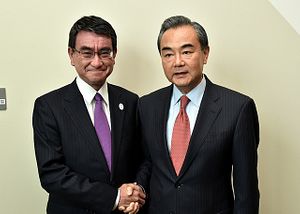This year marks the 40th anniversary of Japan and China’s Treaty of Peace and Friendship. As part of a corresponding thaw in relations between Beijing and Tokyo, Japanese Foreign Minister Taro Kono paid his first visit to China from January 28 to 29. During his visit, Kono held a series of meetings with Chinese high officials, including Chinese Foreign Minister Wang Yi, State Councilor Yang Jiechi, and Premier Li Keqiang.
According to China’s state news agency, Xinhua, both nations agreed to hold a new round the once-annual China-Japan-South Korea leaders’ meeting “as soon as possible” and “foster the proper environment for the trilateral summit.”
“The Japanese side hopes to work together with China to meet each other halfway, and jointly promote further improvement and advancement of bilateral ties,” Kono said. He also invited Li Keqiang to pay an official visit to Japan.
At the regular press conference on January 29, China’s foreign ministry spokesperson, Hua Chunying, revealed that Kono also expressed a positive attitude toward Japan’s participation in China’s Belt and Road Initiative during his visit.
“We have said many times that the Belt and Road Initiative put forward by China aims to pool the efforts of all relevant countries to enhance infrastructure connectivity and seek greater synergy between their development strategies,” Hua said. “If the Japanese side adopts a more open and positive attitude towards advancing the Belt and Road Initiative, this will definitely be of positive significance to the respective development of Japan and China and China-Japan relations.”
Kono’s rhetorics in China were in line with Japanese Prime Minister Shinzo Abe’s recent change of policy toward China.
As The Diplomat has been following, since last year both Japan and China have repeatedly conveyed an interest in mending bilateral relations. Particularly, Abe has publicly invited Chinese President Xi Jinping to visit Japan.
During a surprise appearance at an event marking China’s National Day at the Chinese Embassy in Tokyo last September, Abe said, “The next thing will be my turn to visit China. After my visit to China, I want President Xi to visit Japan.”
Last week, in a speech to the Diet, Abe once again expressed his desire to visit China so as to deepen “friendly relationship in a stable manner from a broad perspective.”
“We hope to host a Japan-China-ROK Summit as early as possible and welcome Premier Li Keqiang to Japan. I hope to visit China at an appropriate timing and realize President Xi Jinping’s visit to Japan at the earliest possible time,” Abe said. “Through conducting more mutual visits at a high level, we will elevate the Japan-China relationship to a new level.”
Abe also expressed willingness to “work with China to meet the growing infrastructure demand in Asia” and boost exchanges between peoples at all levels, including business, culture, tourism, and sports.
Noting Abe’s “positive remarks,” Hua said:
Now China-Japan relations are at a critical stage where positive progresses have been made and yet many disturbances and hurdles still exist. We hope that the Japanese side can make concerted efforts with China and move in the same direction to bring bilateral relations back to the track of normal and sound development at an early date.
It’s also worth mentioning that Taro Kono’s father, Yohei Kono, had also served in the Japanese government as a former Japanese foreign minister and deputy prime minister. The elder Kono is famous for his friendly attitude toward China and has been frequently invited by Beijing to attend various political events. It appears that Taro Kono might be able to repeat his father’s political success in rekindling friendly China-Japan relations with Abe’s support.
































